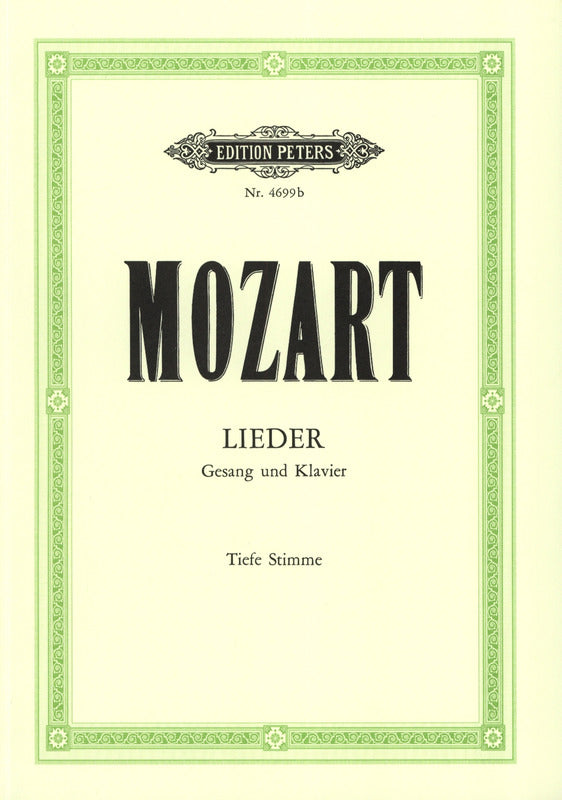Mozart: Selected Songs and Arias for Voice and Piano
Expected to ship in about a week.
- Composer: Wolfgang Amadeus Mozart (1756-1791)
- Editor: Hans Joachim Moser
- Instrumentation (this edition): Piano, High Voice
- Originally for: Piano, Voice, High Voice, SATB Choir, Soprano, Orchestra, Bass, Tenor, Strings, Opera, Tenor I, Tenor II
- Work Language: German
- ISMN:
- Size: 7.5 x 10.6 inches
Works:
- An die Freude, K. 53 (43b)
- "Daphne, deine Rosenwangen" from Bastien and Bastienne, K. 50 (46b)
- Geheime Liebe (K. 125e) from Litaniae de venerabili altaris Sacramento, K. 125
- Die Zufriedenheit im niedrigen Stande (K. 125f) from Litaniae de venerabili altaris Sacramento, K. 125
- Wie unglücklich bin ich nit (K. 125g) from Litaniae de venerabili altaris Sacramento, K. 125
- An die Freundschaft (K. 125h) from Litaniae de venerabili altaris Sacramento, K. 125
- Die grossmütige Gelassenheit (K. 125d) from Litaniae de venerabili altaris Sacramento, K. 125
- Ridente la clama, K. 152 (210a)
- "Oiseaux, si tous les ans", K. 307 (284d)
- "Dans un bois solitaire", K. 308 (295b)
- Brüder, lasst uns lustig sein from Zaide, K. 344
- An die Bescheidenheit ("Verdankt sei es dem Glanz der Großen"), K. 392 (340a)
- An die Ensamkeit ("Sei du mein Trost"), K. 391 (340b)
- "Ich würd' auf meinem Pfad", K. 390 (340c)
- Die Zufriedenheit, K. 349 (367a)
- "Komm, liebe Zither, komm", K. 351 (367b)
- Romanze from Die Entführung aus dem Serail (The Abduction from the Seraglio), K. 384
- Warnung ("Männer suchen stets zu naschen"), K. 433 (416c)
- Lied zur Gesellenreise, K. 468
- Der Zauberer (K. 472) (1785)
- Die Zufriedenheit (Christian Felix Weiße), K. 473
- Die betrogene Welt, K. 474
- Das Veilchen, K. 476
- Zur Eröffnung der Logenversammlung ("Zerfließet Heut, Geliebter Brüder"), K. 483
- Zum Schluss der Logensversammlung ("Ihr Unsre Neuen Leiter"), K. 484
- "Sagt, holde Frauen" from Le nozze di Figaro (The Marriage of Figaro), K. 492
- Lied der Freiheit, K. 506
- Die Alte, K. 517
- Die Verschweigung, K. 518
- Das Lied der Trennung, K. 519
- Als Luise die Briefe ihres ungetreuen Liebhabers verbrannte, K. 520
- Abendempfindung an Laura, K. 523
- An Chloe, K. 524
- "Wenn du fein artig bist" from Don Giovanni, K. 527
- Des kleinen Friedrichs Geburtstag, K. 529
- Das Traumbild, K. 530
- Die kleine Spinnerin, K. 531
- Ich möchte wohl der Kaiser sein, K. 539
- Un moto di gioia, K. 579
- Sehnsucht nach dem Frühlinge, K. 596
- Der Frühling, K. 597
- Das Kinderspiel, K. 598
- "Die ihr des unermeßlichen Weltalls" (Cantata), K. 619
- "Bei Männern, welche Liebe fühlen" from Die Zauberflöte (The Magic Flute), K. 620
- "Ach, verzeih, du Auserwählte" from La clemenza di Tito, K. 621
- "Nun, liebes Weibchen", K. 625 (592a)
- Das Bandel, K. 441
- "Grazie agl'inganni tuoi" (Die ungetreue Nice), K. 532
- Caro mio Druck and Schluck, K.Anh.5 (571a)
- "Schlafe, mein Prinzchen, schlaf ein", K. 350
Publishers use a lot of words to describe what they sell, and we know it can be confusing. We've tried to be as clear as possible to make sure you get exactly what you are looking for. Below are descriptions of the terms that we use to describe the various formats that music often comes in.
Choral Score
A score for vocalists that only contains the vocal lines. The instrumental parts are not there for reference. Generally, cheaper than a vocal score and requires multiple copies for purchase.
Facsimile
Reproductions of the original hand-written scores from the composer.
Full Score
For ensemble music, this indicates that the edition contains all parts on a single system (there are not separate parts for each player). In larger ensembles, this is for the conductor.
Hardcover
Hardbound. Generally either linen-covered or half-leather.
Orchestral Parts
Similar to a wind set, this is a collection of parts. In the case of strings, the numbers listed are the number of copies included, though generally these are available individually (often with minimum quantities required).
Paperback
When publishers offer multiple bindings (e.g. hardcover) or study scores, this is the "standard" version. If you're planning to play the music, this is probably what you want.
Performance / Playing Score
A score of the music containing all parts on one system, intended for players to share. There are not separate parts for each player.
Set of Parts
For ensemble music, this indicates that there are separate individual parts for each player.
Solo Part with Piano Reduction
For solo pieces with orchestra, this is a version that contains a piano reduction of the orchestra parts. For piano pieces, two copies are typically needed for performance.
Study Score
A small (think choral size) copy of the complete score meant for studying, and not playing. They make great add-ons when learning concertos and small chamber works.
Vocal Score
A score prepared for vocalists that includes the piano/organ part or a reduction of the instrumental parts.
Wind Set
For orchestral music, this is a collection of wind and percussion parts. The specific quantities of each instrument are notated.
With Audio
In addition to the printed music, the edition contains recordings of the pieces. This may be an included CD, or access to files on the internet.
With / Without Fingering (Markings)
Some publishers prepare two copies - a pure Urtext edition that includes no fingering (or bowing) suggestions and a lightly edited version that includes a minimal number of editorial markings.




